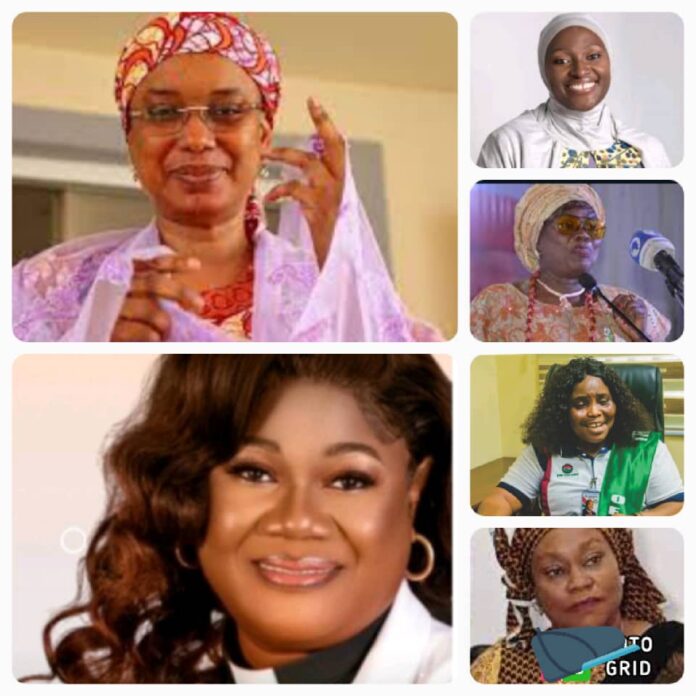Who will Become Nigeria’s First Elected Female Governor?
By Nafisat Bello
“There are two powers in the world; one is the sword, and the other is the pen and there is a third power stronger than both; that of women.”
– Malala Yousafzai
Since the beginning of time, Nigerian women have played significant roles in the evolution of the country as well as its emancipation from slave trade, imperialism, military rule and other phases of national life. From Efunroye Tinubu (First Woman to buy a car) to Funmilayo Ransome-Kuti, (First Woman to drive a car) to Grace Alele Williams (First Female University Vice Chancellor) to Olabisi Oreofe Ugbebor (First Female Professor of Mathematics) to Folake Solanke (First Female Senior Advocate of Nigeria) to Professor Jadesola Akande (First Female Professor of Law), to Justice Alooma Mukhtar (First Female Chief Justice of Nigeria) and to many others, Nigerian women have been blazing the trail long before our forebears dreamt of independence and even after we achieved self-rule, they never stopped pushing the glass ceiling.
Ironically, while women have excelled in the above professional fields and others, the glass ceiling has become too strong for them to overcome in politics and governance. That is why 62 years after independence, no woman has been found good enough to be President, Vice President or Senate President. Olubunmi Patricia Etteh managed to be elected as Speaker of the House of Representatives in 2007, which is the number four citizen, but when misogynists in the House got on her case, she was thrown out with ignominy over criminal allegations that were later found to be false. That is the fate of women as far as elective offices are concerned in Nigeria!
Not even at the state level has any Nigerian woman been honoured with the number one position either by election or circumstances…
Dame Virginia Ngozi Etiaba however broke the jinx in 2006 when she became the first female governor in Nigeria following the impeachment of her boss, Peter Obi, for alleged gross misconduct. This euphoria did not last beyond three months as the courts reinstated Obi as governor in early 2007.
Who will Surpass Etiaba’s Record?
Since 2006, a lot of Nigerian women have thrown their hats in the ring and sought the highest office in their respective states to no avail. The present Minster of Women Affairs, Pauline Tallen, who once served as Deputy Governor of Plateau state also once sought to be Governor but narrowly lost to the incumbent, Jonah Jang. The late Aisha Alhassan, aka Mama Taraba, lost at the polls to incumbent Darius Ishaku, won at the Tribunal but eventually lost the legal battle at the Appellate Court. No one has come closer since then….
But Nigerian women are not giving up. Ahead of the 2023 general election, there are ten women seeking to be governors of their respective states, three in the North, seven in the South.
Read Also:
The most prominent of them is Senator Aishatu Dahiru Ahmad, aka Binani, who is the only woman holding the gubernatorial ticket of any of the two leading parties in the country. She defeated heavyweights like former EFCC boss, Nuhu Ribadu, former governor, Jibrilla Bindow, etc to clinch the ticket of the All Progressives Congress (APC) in Adamawa state. She is said to be a force to reckon with in the state and she could pull an upset by defeating the incumbent, Ahmad Fintri, of the Peoples Democratic Party (PDP).
Another powerful woman in the race is Nnenna Lancaster-Okoro. She is the gubernatorial candidate of the Peoples Redemption Party (PRP) in Abia state. An experienced international lawyer who understands the unique challenges faced by lawyers handling cross-border issues, Nnenna is also a graduate of English & Philosophy (combined) BA Hons from the University of Lagos. She trained as a network (Microsoft -MCP) and internetwork (Cisco Professional CCNP) Engineer. She is also a tech guru who worked as a Telecommunications Engineer in Network Management Centres and Network Remote Integration in the UK, after qualifying as one of the first twenty nine Cisco Professionals in the UK.
Nnenna ran for Senate as the Candidate of the APC for Abia North in 2015. She was also the FCT 2019 Senatorial Candidate of Young Progressives Party (YPP).
In that same Abia state, Hon Ngozi Ogbuleke is seeking to be the governor on the platform of the Social Democratic Party (SDP).
Comr. Chief Mrs. Beatrice Itubo, the Riya tugwu-Igo 1 of Okporoworo-Ogbakiri, is the Chairman of the Nigeria Labour Congress (NLC) Rivers State Council and also the gubernatorial candidate of the Labour Party in Rivers State.
Hajiya Khadijat Abdullahi-Iya is the first female governorship candidate in the history of Niger State. She emerged winner at the governorship primary of the All Progressives Grand Alliance (APGA) in the State ahead of the 2023 general election after defeating a male contender, Alhaji Mohammed Usman, with 121 votes against 20.
Chief (Dr) Kasim Jackie-Adunni, is the gubernatorial candidate of the New Nigerian Peoples Party (NNPP) in Ogun State. She was the only female candidate in the last gubernatorial election In Ogun State in 2019. The 70-year-old is a philanthropist and has contributed immensely to girl-child education, poverty eradication and youth /student empowerment in the state. She is the Jagunmolu Iyalode of Igbore Land; Iyalaje of Sango-Ota and Yeye Loro of Akinwale Owu Kingdom in Ogun State.
Other female governorship candidates include Obiang Marikane Stanley of the Action Democratic Party (ADP) in Cross River State; Sophia Cookey of the Zenith Labour party (ZLP) in River State; Tina Barde of the of Labour Party (LP) in Niger State; and Iskil-Ogunyomi Sufiat Olajogun Adekemi of the Action Alliance (AA) in Ogun State.
Whatever happens in February 2023, Nigerian women have achieved another feat by showing massive interest in the way politics is played and the way their country is governed. 2023 will be another milestone no matter the outcome… And this particular glass ceiling will come crashing one day!
















